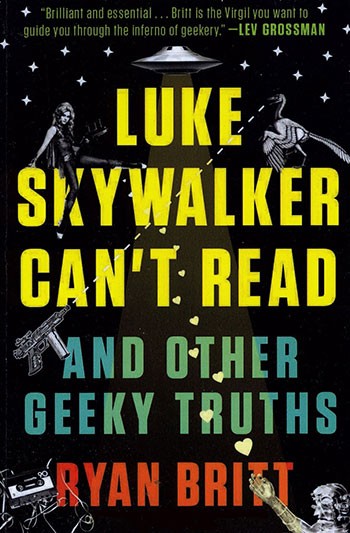Luke Skywalker Can’t Read: And Other Geeky Truths. Written by Ryan Britt, 2015 Plume Books. 210 pages, softcover. (9 out of 10)
Sometimes a title just grabs you. And when it’s about a character I’ve identified with for nearly as long as I can remember, I notice. So when I saw “Luke Skywalker Can’t Read” — I grabbed it. I hadn’t heard of author Ryan Britt before, but as I read his book, I felt like I’ve known him forever. The collection of a dozen or so essays is all about how Ryan processes different parts of geek culture, ranging from his childhood through his teen and college years, and up through the hype for “The Force Awakens.”

The best thing I can say about “Luke Skywalker Can’t Read” is that it feels like your very best geeky conversations with your best geeky friend. A friend you don’t always get along with, a friend that you’re sure is an idiot half the time and a genius the other half, but a friend who you love to stay up late talking about the minutiae of geeky fandoms with. If you’re reading this, you probably know what that experience is like. Some of us have those conversations daily, but others…you look forward to them every time you can have them. And this book collects several of them.
The titular essay is one of my favorites. It’s not about Luke Skywalker per se, but about the whole Star Wars universe that we visit as observers through the movies, cartoons, and books…but mostly the movies. His argument is essentially that where characters in other franchises (Harry Potter, Lord of the Rings, Star Trek) make reference to real and imagined literature within their respective universes, Star Wars does not. Hermione will consult books in the library, a trusted source of knowledge that helps Hogwarts students overcome evil. Gandalf and company consult books, and Bilbo even writes “The Hobbit” as a book in itself. Captains Kirk and Picard quote Shakespeare, Dickens, and Melville. In the Star Wars movies on the other hand…books are almost entirely absent. Characters have an oral tradition handed down from generation to generation, but there don’t seem to be written records. Britt poses this as one of the reasons that the entire galaxy who has seen thousands of Jedi Knights in action right up through “Revenge of the Sith” can forget about them to the point that Jedi are myths and legends within nineteen years (by the beginning of “A New Hope”). We see this happen again in the period between “Return of the Jedi” and “The Force Awakens” — Han Solo has to convince Rey and Finn that “it’s real, all of it.” Britt spends about twenty pages on this idea, and does it in a better way than I’ve summarized here…but it becomes a solid, interesting argument. It takes the text of those movies, which at this point is imprinted on my DNA, and makes me look at it completely differently. I value those kinds of geeky experiences.
Another excellent essay is “Nobody Gets Mad About Hamlet Remakes: Rise of the Relevant Superheroes,” and how we all just need to chill out with our freakouts over superhero remakes and reboots. About the idea of these characters as a shared text that grows and changes over time to include more than what they were first imagined. At this point we’ve had our oldest superheroes (Batman, Superman, Wonder Woman, Captain America) for 75 years and more…and each generation is getting to put their mark on the characters. If that means my Superman isn’t the same as your Superman, it’s okay. It’s the nature of a transgenerational text to do that. Britt’s comparison to Shakespeare is apt, although truthfully, people do get pissed about Hamlet remakes. The Mel Gibson one was the best, you guys.
In each case, Britt sheds new light on geeky truths
There are essays on “Barbarella,” on Sherlock Holmes, and “Back to the Future,” and in each case, Britt sheds new light on the characters, movies, or books he’s discussing. And these are topics that I overthink about and process and want to talk to other geek friends about…reading these essays relieves some of that pressure. Besides the topics themselves, the way Britt writes is very engaging. He puts his personal experiences in, framing the geeky episodes at a particular time in his life, and connecting them to friends, and family members. We get a more full picture of why he thinks the way he does about Doctor Who because of what he was going through at the time; we appreciate the barrage of F-bombs in a certain chapter because that’s how we expressed ourselves at that stage of life too. Enjoying Britt’s voice becomes a big part of enjoying the book, and by the end of the essays, I felt like I knew him, liked him, and wanted to read more.
If you’re a fan of Star Trek, Star Wars, Doctor Who, Sherlock Holmes, Back to the Future, Lord of the Rings, Dracula…okay, just about anything geeky, chances are good you’ll find an essay at least touching on it in “Luke Skywalker Can’t Read: And Other Geeky Truths.” I liked it more than I expected to–and I expected to like it. I didn’t expect it to make me think. Read it so we can talk about it. It’s good.